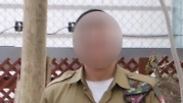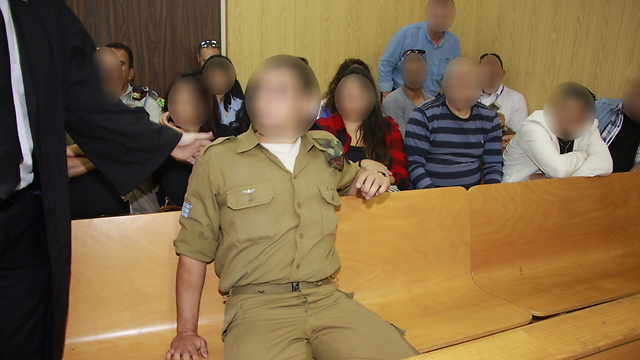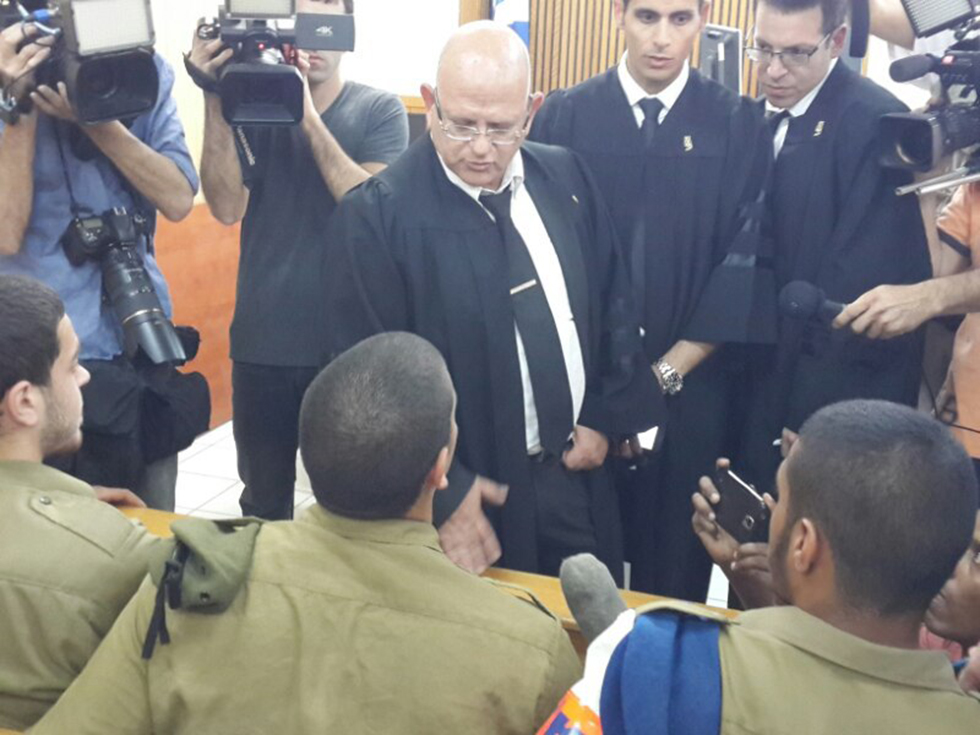
Hebron soldier to remain in open detention
The prosecution asked the court to return the soldier who shot a neutralized terrorist to full arrest status, but their appeal was struck down.
“Allegedly, this is a forbidden act, which is in contrast to state and international values, (and) which also violates the IDF’s (principle of) weapons purity, which says weapons are to be used only for the purposes of completing the mission, and our humanity must be preserved,” the judge, Brig. Gen. Doron Feyles, wrote.
But the judge later added, “the defense’s video shows testimony by people from the area (in which the incident occurred) and most of them worried that the terrorist might be carrying (an explosive device), unlike (what can be inferred from) the prosecution’s video.” The judge also stated that, “The (defendant’s) worry is allegedly an alternative explanation for the evidence collected.”
Earlier in the day, the prosecutor in the case stated that the "suspicion is still murder, there is enough evidence for an indictment", and expressed hope that “next week an indictment will be served following the completion of the investigation.”
During the hearing on Tuesday afternoon, it was revealed that the soldier stated to investigators at the criminal investigation division, “My hands were full of my comrade's blood. I was enraged. In a split second I decided to shoot. If there was an explosives belt (on the terrorist- ed.), I would be in the cemetery and not in court. You investigators at the investigative division are sitting in an office and not in the field where you can be shot at."

The military prosecution, headed by the chief prosecutor Col. Sharon Zagagi-Pinhas, appealed the decision last Thursday by Judge Lt. Col. Ronen Shor to release the soldier to open detention. An autopsy was conducted Sunday on the terrorist, and it emerged that the soldier's shooting caused his death. That day the soldier’s defense team received part of the investigation material from the prosecution, and they claim that the accumulated evidence points in favor of the soldier.
During the hearing the military prosecutor said that they have a "video showing the soldier after the incident during the evacuation of the body, which shows that he was not moved and agitated as he claimed." They confirmed that the first summary of the autopsy revealed that the shot to the terrorist’s head was fatal. They also claimed that "more evidence shows that the suspect’s explosive device version was stated by the soldier after receiving legal advice."
According to the military prosecution, "the suspect’s version is twisting and developing and therefore his claim regarding the explosive device is not sincere. We do not believe his claim that he acted in self defense. We will prove that he actually acted contrary to orders."
"Everyone was shooting, so I shot"
The plaintiff related the testimony of the soldier half a minute before the fatal shooting: "What, the terrorist is alive?" Later, after the shooting, the suspect told T. and A. (soldiers in the unit) and a company commander, "They stabbed my friend and tried to kill him so he deserves to die."
Plaintiff argued, "It was expected of him in this situation that if he really feared an explosive device, after he shot, he should have said that he shot him because he feared an explosive device. The company commander told him, 'Why did you do such a terrible thing?"
"The suspect entered the battalion commander's area at around 10:30am and only then did he raise his concern that there was a danger from the terrorist, and then said that the fear was from a knife. The battalion commander told him, 'Then why did you shoot him and not kick the knife away? I think you're lying," the plaintiff concluded.
But the judge at the hearing also pointed out that the company commander, according to the testimony, also feared an explosive device, and therefore wondered why the soldier's fear of an explosive charge would not be considered honest.
The plaintiff replied: "If there was a real and serious concern, they would have operated differently. None of the commanders in charge thought that the terrorist had an explosive device."
Zagagi Pinchas reported that the paramedic on the scene reported that the soldier said, "Everyone was shooting at him, he moved a hand and his head towards the knife so I shot." Although he was far from the knife.
The soldier's attorney Ilan Katz said, "The prosecution presents a one-sided picture which is contrary to the evidence. According to the company commander's testimony, the soldier looked shocked after the incident, he was a good soldier; this is contrary to the claims that the soldier was cheerful after the incident."
He also claimed that the paramedic at the scene testified the following: "I felt that the suspected soldier looked scared and I referred him to the mental health officer. He sounded very confused, did not understand what I meant, he changed his words."











